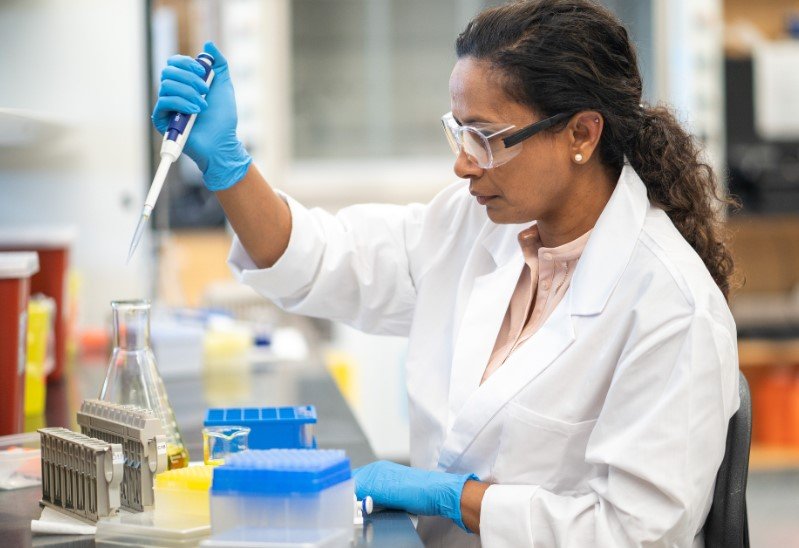King Faisal Specialist Hospital and Research Centre in Riyadh has made a major advance in cancer treatment by producing and using its own CAR-T therapy. This step marks Saudi Arabia’s first in-house effort in this field, cutting costs and speeding up care for patients with tough blood cancers.
This breakthrough happened on September 3, 2025, when doctors gave the first dose to a patient with relapsed or refractory B-cell acute lymphoblastic leukemia. It shows how the hospital is leading in cell and gene therapies, helping more people get life-saving treatments faster.
What is CAR-T Therapy and Why It Matters
CAR-T therapy changes a patient’s immune cells to fight cancer better. Doctors take T-cells from the blood, add special receptors, and put them back in the body to attack cancer cells.
This method has changed how we treat some blood cancers, like leukemia and lymphoma. Before, hospitals sent cells abroad for changes, which took weeks and cost a lot. Now, local production fixes those problems.
Many patients saw good results from CAR-T in trials around the world. For example, studies show remission rates over 80 percent in some cases. This gives hope to those who did not respond to other treatments.
Experts say this therapy could expand to solid tumors soon. With ongoing research, it might help more cancer types by 2030.
How KFSHRC Made This Possible
The hospital started treating patients with imported CAR-T in 2020. They have helped over 200 people so far, building skills along the way.
Teams from different departments worked together. Hematology experts, researchers, and lab staff joined forces to create a full system for making and testing the therapy.

This teamwork led to the Phase I clinical trial. The trial tests safety and how well the local version works. Early signs look promising, with the first patient getting treatment without major issues.
Saudi leaders support this through Vision 2030. The plan aims to boost biotech and make the country a hub for medical innovation.
Cutting Costs and Improving Access
One big win is the drop in price. Commercial CAR-T can cost over one million riyals per treatment. The local version brings it down to about 250,000 riyals.
This 80 percent cut helps more patients afford care. It also reduces wait times from months to just 14 days.
Here are key benefits of local production:
- Faster treatment starts, which can improve outcomes.
- Less need for shipping cells overseas, avoiding delays.
- More control over quality and supply.
- Potential to treat hundreds more patients each year.
The hospital plans to ramp up to 100 gene therapies annually. This growth will meet rising demand in the region.
Global Impact and Recognition
KFSHRC ranks as the top hospital in the Middle East and 15th worldwide for academic medical centers. It also leads as the most valuable healthcare brand in Saudi Arabia.
This success ties into global trends. Countries like the US and China invest heavily in cell therapies. Saudi Arabia now joins them, drawing international attention.
The hospital will share its story at the C3 Davos of Healthcare New York Summit soon. Leaders there will discuss AI, data, and precision medicine.
Other recent events show progress. For instance, new studies in 2025 highlight better CAR-T designs using tools like CRISPR. These could make therapies safer and more effective.
Challenges and Future Outlook
No breakthrough comes without hurdles. Making CAR-T needs strict safety rules and skilled staff. The hospital trained teams for years to meet global standards.
Side effects like immune reactions can happen. Doctors monitor patients closely to manage risks.
Looking ahead, experts predict more advances. By 2030, cell therapies might become standard for many cancers. Saudi Arabia aims to lead in the Middle East.
| Aspect | Imported CAR-T | Local CAR-T at KFSHRC |
|---|---|---|
| Cost per Treatment | Over 1.3 million riyals | About 250,000 riyals |
| Production Time | Several weeks to months | Up to 14 days |
| Patients Treated Since 2020 | Over 200 (imported) | Expanding to in-house |
| Annual Capacity Goal | N/A | 100 therapies |
This table shows how local efforts make a real difference.
The hospital’s work inspires other nations to build their own systems. It proves that focused investment can transform healthcare.
What do you think about this medical advance? Share your thoughts in the comments and spread the word to help others learn about these life-changing therapies.
